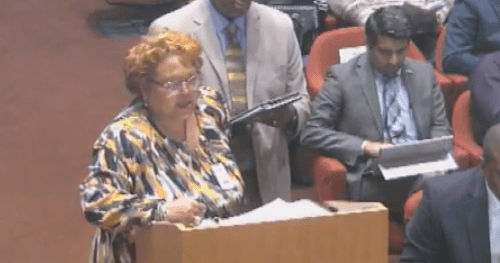Dallas County taxpayers are shelling out another $6 million for new voting equipment, after the county discovered components bought just last year can’t be used securely—a costly mistake one local official blames on the head of the county’s elections department.
In 2019, the county spent $30 million on a brand-new voting system; it included “hybrid” electronic voting machines with paper backups, plus electronic pollbooks used to access the county’s list of registered voters. But the county has since discovered the pollbooks can’t interface securely with the voting machines and must be replaced.
Dallas County Elections Administrator Toni Pippins-Poole asked the commissioners court at their last meeting for $388,000 to add 300 more electronic pollbooks to a December order of 4,200 units, bringing the total spent on the replacement equipment to just over $6 million.
County Commissioner J.J. Koch grilled Pippins-Poole on her request to increase the order, and why the new equipment was needed in the first place. Koch said a rush to implement countywide voting, combined with consistently poor communication from the elections department, led to the costly mistake.
“We’ve now wasted $6 million of taxpayer money, and this body has not had effective oversight of how these pieces work together,” Koch said.
The county bought the new voting equipment last year to replace aging machines and to allow Dallas to use countywide polling places that let voters cast ballots at any polling location in the county on Election Day.
Counties must use direct recording electronic (DRE) voting machines in order to use countywide vote centers. The new ExpressVote hybrid voting machines Dallas bought from ES&S meet that requirement.
Electronic pollbooks are also required for countywide polling places. They sync voting information with the county’s voter database, so election workers can verify if voters have already cast a ballot. Dallas bought new e-pollbooks last year from another vendor, Tenex.
Pippins-Poole acknowledged the pollbooks she ordered ahead of last November’s election do not meet current security standards, but said the requirements changed and Tenex couldn’t meet the new specifications.
The new performance and security requirements were released last October, following legislation (House Bill 4130) by State Rep. Valoree Swanson (R–Spring) directing the Secretary of State to set specific standards for certifying electronic pollbooks.
The new ES&S pollbooks should meet those requirements—if they arrive on time and everything goes according to Pippins-Poole’s implementation plan.
Some of the new pollbooks have been delivered—enough to use for poll-worker training. But 2,400 units aren’t scheduled to be delivered until next month, and all units will need to be prepared and tested before use. Early voting in the March 3 primaries begins February 18—now just four weeks away.
Koch told Fox 4 News that Dallas County is “absolutely not” ready for the March primary elections and said there is no backup plan if anything goes wrong with the new equipment.
“We will face significant challenges with the infrastructure and system we have in place right now,” he said.
On top of the $6 million pollbook mistake, Koch said taxpayers are out another $1 million in rent to store the equipment, because warehouse space in the elections department’s new building isn’t ready.
Koch puts the blame squarely on Pippins-Poole.
He told Texas Scorecard she has circumvented effective oversight by providing commissioners with shoddy briefings just days ahead of court meetings at which key decisions on big budget items must be made.
Until she is held accountable, he said, public confidence in Dallas elections will continue to drop.
Under Pippins-Poole’s direction, Dallas County elections have been the subject of several mail-ballot fraud investigations, including allegations that some elections department employees were involved in the schemes. A number of complaints have charged her office with misconduct for failing to follow proper procedures. She was even caught soliciting cash donations from vendors.
Dallas residents wondering how Pippins-Poole has kept her job for almost 10 years can look to their county election board, a group of five local elected officials tasked by state law with appointing an elections administrator: County Judge Clay Jenkins, County Clerk John Warren, Tax Assessor-Collector John Ames, and the chairmen of the Dallas County Democrat and Republican parties. Jenkins, Warren, and Ames are all Democrats who have held office for a decade or more.
Terminating an elections administrator requires a four-fifths vote of the election board and approval by a majority of county commissioners.
Before he was elected to the commissioners court in 2018, Koch filed a lawsuit asking a district court to remove Pippins-Poole from office for incompetence and official misconduct. He said the county officials tasked with oversight of the elections department were not interested in taking any action against Pippins-Poole. Koch is the lone Republican on the court.
“We’re going to try to do the best that we can,” Pippins-Poole told the commissioners. “But there’s no perfect election.”
For Dallas County taxpayers and voters, Pippins-Poole’s best has been far from good enough.





